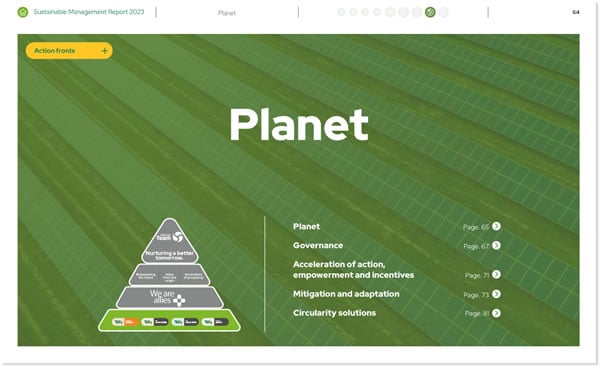Report 2023










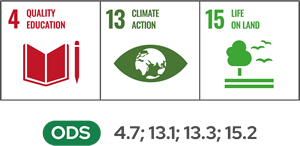
Climate change is one of the greatest challenges we face as a society and, according to our latest materiality analysis for the year 2022, the most relevant material issue for Alianza Team. We know that being resilient is not only limited to the management of greenhouse gassesgases, so from our Climate Strategy we give a comprehensive scope to the environmental dimension acting from two fronts: governance and mitigation and adaptation.
Governance, oriented to risk and opportunity management, provides us with key elements for decision making to accelerate mitigation and adaptation actions. We adopt recommendations from global frameworks and benchmarks that go beyond legal compliance, seeking corporate alignment, empowering natural leaders and mobilizing and inspiring our stakeholders.
Mitigation and adaptation starts with optimizing operations, covering crucial components such as smart supply and demand planning, innovation, technological evolution and supply chain collaboration in order to achieve a lower environmental impact and moving towards circularity in our products and packaging. Our work goes beyond our facilities, and as in the Responsible Sourcing Strategy, we work hand in hand with our direct and indirect suppliers to contribute to their development, protecting strategic ecosystems in the areas where we operate in order to be allies from the origin.

Structure our corporate climate strategy to set our Science-Based Targets based on reliable data and long-term projections.
Structure long-term projects with our brands and businesses that generate high social and/or environmental impact.
To make Alianza Team's Manos Verdes® circular economy program a benchmark with regional impact and presence in at least four countries.
During 2023 we ran a preliminary identification of physical and transition risks we face as a company with the accompaniment of ERM - Environmental Resources Management.
Scenarios SSP1-2.6¹ and SSP3-7.0² were used to evaluate physical risks, finding that extreme heat in Colombia and water stress in Mexico and Chile are the most relevant risks for the organization.
For palm extractors, 4 risks were identified, concluding that extreme heat, forest fires and extreme winds can have a significant effect on productivity and flooding on quality. We are working on linking the results with other studies in the sector to better understand the impact at the supply level.
For transitional risks, using the STEPS³ and APS⁴ scenarios, we identified carbon pricing mechanisms, transition to low-emission technologies, rising feedstock costs, and energy and fuel costs as the most relevant risks. We are close to completing this assessment for our Mexico and Chile operations.
We identified opportunities in resource efficiency, access to new markets, product and service innovation, new energy sources and resilience.
An example of how we are already capitalizing on these opportunities is the award received at the Food Ingredients Europe Innovation Awards for our Mirror Tissue technology, which is capable of mimicking the characteristics of animal fats in a vegetable-based product.
1 SSP1-2.6: Low-emissions scenario limiting to 2°C at 2,100, aligned with the Paris Agreement.
2 SSP3-7.0. Medium to high emissions scenario, by 2100 emissions are almost doubled and temperatures will have increased by 3.6°C. Competitiveness between countries increases and local issues are prioritized.
3 STEPS: Reflects a sector-by-sector review of existing policies and measures. It is associated with a temperature increase of 2.4°C in 2100 (with a 50% probability).
4 APS: Assumes that countries without ambitious long-term commitments benefit from accelerated cost reductions of clean energy technologies. It is associated with a temperature increase of 1.7°C in 2100 (50% probability).
We value partnerships and in our Vision 2030 we declare that we are allies for the planet and we work every day to continue nurturing a better tomorrow.
We created the initiative #SumarPorElPlaneta, through which we promote new ways of working in sustainable management in order to create constructive experience exchanges between different stakeholders, strengthening technical, operational and strategic knowledge. We currently have 18 companies actively participating in this initiative in Colombia and Mexico.
We organized the III Industrial Environmental Forum in Buga, Colombia, with the participation of more than 150 attendees and speakers from companies such as Celsia/Grupo Argos, Postobón, Gaia, CECODES, Adispetrol S.A., students and teachers from the Agricultural Educational Institution of Guadalajara de Buga.
In Bogota for the first time we worked with 29 transport suppliers, bringing to the table relevant trends in decarbonization of the sector from experts such as GAIA Servicios Ambientales and LOGYCA, in addition to learning about government policies and plans directly from the District Secretariat of Mobility of Bogota.
The involvement of our employees in activities that positively impact our planet and raise awareness of the importance of environmental actions inside and outside the company is a key lever for mobilizing action.
We expanded our volunteer program Aliados Somos Más Por Nuestro Planeta in which more than 130 of our employees participated in experiences and spaces to connect with nature and lead activities such as fairs, festivals, training, workshops and cleaning of ecologically important sites.
As part of the More trees, more life initiative, we planted more than 750 trees, 600 mangrove seedlings and 290 species of flowers in different areas of the country, such as the Mallorquín swamp near Barranquilla, the Mirachuelo eco-environmental park in Bogotá and the Sonso Lagoon in Buga.
Through the More flowers for pollinators initiative we planted 293 species of flowers that, in addition to conserving pollinators, will allow us to recover public green spaces in the areas surrounding our facilities.
At each operation we monitor and verify environmental compliance through monitoring matrices, including local regulatory guidelines.
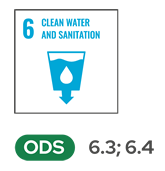
We reduced water withdrawal by almost 15% since 2019 at the corporate level through initiatives such as eliminating leaks, reducing steam consumption, condensate recovery, water recirculation and environmental culture.
In Mexico and Bogota we improved by 13% and 14% respectively the extraction intensity per packed ton indicator compared to 2022 with the implementation of rainwater harvesting and wastewater reuse for cleaning processes and general services.
We expanded water storage at some of our facilities.
We conducted an analysis of the areas exposed to water stress for our 6 operations and for the prioritized suppliers in the palm and soybean chains, using global programs such as the WWF Risk Filters Suite and Aqueduct. We found that Team Foods Chile and BredenMaster in Chile are located in areas with high risk of water stress, and that none of our suppliers have a relevant level of risk at the supply chain level.
We have had no cases of incidents or non-conformities related to water quantity or quality permits, standards and regulations.
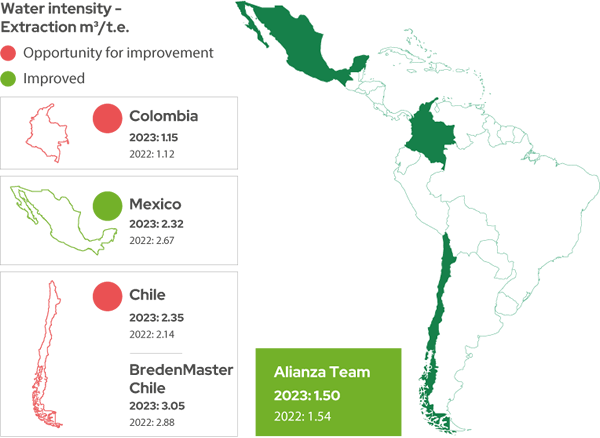
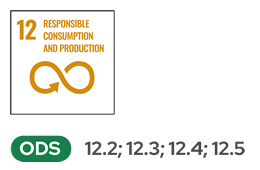
We achieved 87% waste recovery at the corporate level, which represented a 5% increase compared to the 2022 results.
We launched our "Zero Waste" initiative through the More Choices Less Waste program at our Buga facility, with a circular economy approach to natural resource management.
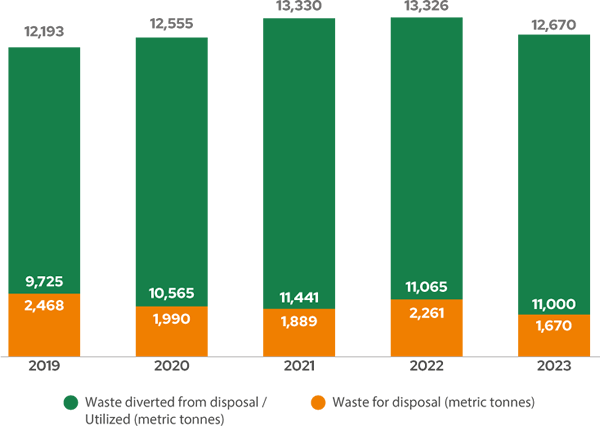
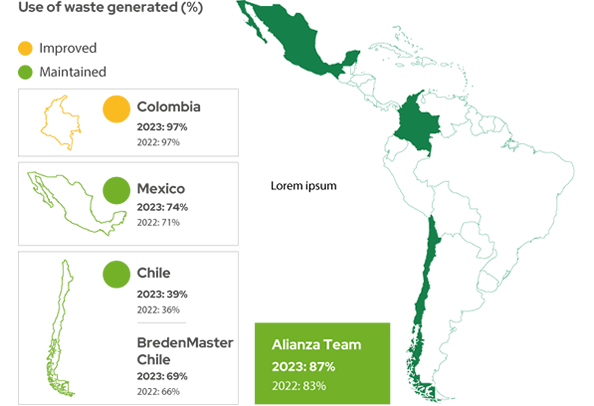
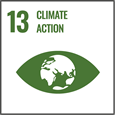
We updated our commitment to Carbon Neutrality by 2030 to one of near-term emissions reductions in line with the Science Based Targets (SBTi) initiative this year, and to Net Zero in the coming years to further the actions to be implemented in our business model and supply chain.
The main challenge in the next two years is to consolidate our decarbonization plan in the three scopes in order to achieve the emission reduction targets set forth by the Science Based Targets initiative.
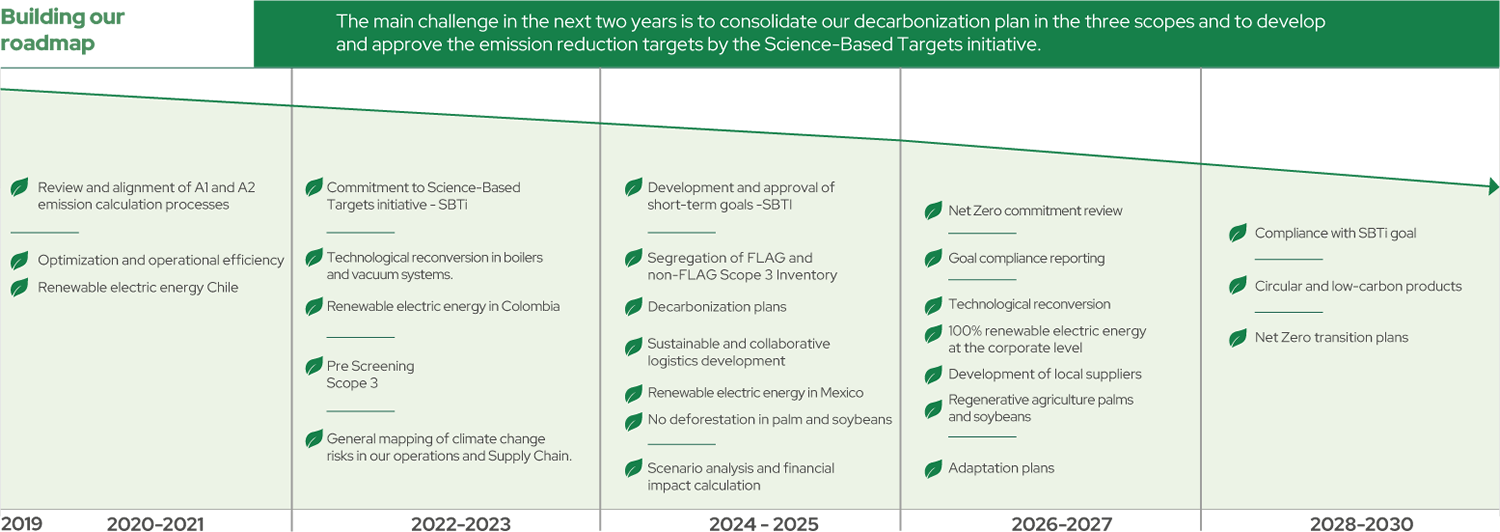
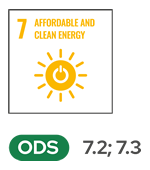
During 2023 we purchased 100% I-Rec certified renewable electric energy for our Colombian operation, which coupled with the Chilean operation, allows us to reach 87% of renewable electric energy at the corporate level.
In Buga we inaugurated a solar farm of 10,000 solar panels that provide approximately 30% of the energy we use in that facility.
We improved energy consumption intensity indicators for our facilities in Colombia and Chile.
We installed a substation and changed all of our electrical circuits at our Barranquilla facility in order to improve the quality and efficiency of the energy used.
We reduced the use of fossil fuels by 5% compared to the previous year as a result of energy efficiency projects in the use of these fuels and the employment of vacuum systems at the Bogota and Barranquilla facilities.
The latter is estimated to represent a reduction in steam consumption of approximately 50% and an increase in production capacity, results that will be reflected from December 2023 onwards.
Mexico will be the first facility to start implementing Ice Condensing technology, which will increase steam production efficiency, an initiative that is part of the environmental projects to be implemented as part of the decarbonization plan.
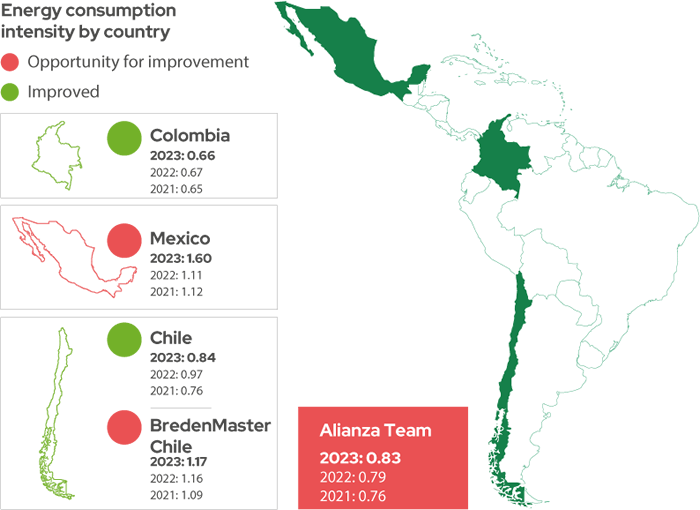
In 2023, we achieved a 17% reduction against the 2019 baseline (104,694 TONCO2e) in absolute terms.
We made progress in the implementation of our Zero Leakage initiative, which included the replacement of our evaporative and pressurization condensers in our refrigeration systems.
We reduced our Scope 2 emissions by 80.5% compared to the 2019 base year.
We identified 10 environmental projects that we plan to implement over the next 6 years, which will enable us to reduce an additional 25% of our emissions in absolute terms.
In 2022 we conducted for the first time the Scope 3 inventory measurement using the GHG protocol - Scope 3 evaluator tool for 13 of the 15 categories.
We are working to strengthen our procurement information databases by mapping the origin of the crop or point of manufacturing of the product.
We initiated a project to map regenerative agriculture practices in palm in Colombia, where we will obtain a customized EF for the region, which will be key to outlining our mitigation roadmap for emissions associated with forests, land and agriculture (FLAG).
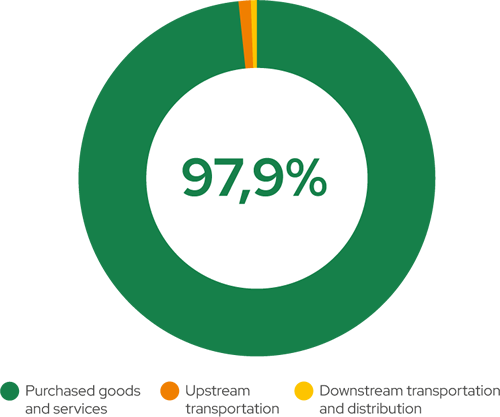
We implemented a Logistics Master Plan for the Colombian operation, aligned with our Vision 2030, focused on the development of capabilities that contribute to the competitiveness of the value chain, incorporating advanced processes and technologies such as data analytics, artificial intelligence and automation focused on four tactics:
Transportation efficiencies:
Load factor optimization and shipment consolidation.
Primary metric:
Load factor (%).
Optimization in the logistics network:
Optimal logistics network, alternative routes or storage optimization.
Main metrics:
Reduction in Km.
Collaborative models:
Load balancing alliances.
Main metrics:
Empty trips (to avoid them).
Low-emission fleet:
100% Carbon efficient and state-of-the-art vehicles by 2030.
Core metric:
% carbon efficient fleet.
We made progress in the implementation of our Optimus program, which has managed to increase the load factor by 12%, which means a reduction of 252 “tractomulas” by 2022, representing 137,368 kilos of CO2 avoided, and 88,900 kilometers saved, which is equivalent to 2.2 trips around the planet.
We worked on optimizing our in-facility storage and direct deliveries to our customers, thus reducing our trips by 4,500 km compared to last year.
We organized and participated in workshops with various partners for the implementation of a collaborative transportation model for freight compensation. As a result of this initiative, we now have 6 round routes and 10 load generators, which allowed us to reduce emissions on these routes by 50%.
We made progress in our intention to have a 100% carbon efficient vehicle fleet by 2030 with the incorporation of two gas-powered vehicles on the Bogotá-Barranquilla routes and one electric vehicle for last mile distribution.
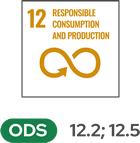
We are working on the development of a tool for the life cycle analysis and screening of our products, including carbon footprint and water use from the procurement of raw materials to our customers' doorstep. This tool will be key in decision making at the innovation and product development level.

During 2023 the quality assurance team led a mapping of the processes in our facilities to understand where food losses are generated.

We found that the majority of customer returns do not generate losses because they are reprocessed in our facilities as a first option, as long as they meet safety, quality and regulatory criteria.

Of the losses generated, more than 70% are destined for alternative uses, either transformed into biofuels through our Manos Verdes program, composted, or sold for animal feed and other industrial uses.

We created a corporate packaging information system and a packaging taxonomy that allows us to unify data to monitor the progress of the objectives set out in our commitment.
We updated our commitment and management approach in three areas:
REduce
Eliminate non-essential packaging, reduce weight and complexity in the design of packaging materials.
REthink
Design our packaging to be recycled, composted or reused.
REsponsibilize
Guarantee the circularity of our packaging cycle and promote this under extended producer responsibility (EPR).
In the Standard Team, we defined the sustainability criteria for our packaging, and developed the methodology for assessing progress toward our recyclability goal.
56.7% of packaging in the wood fiber and paper category is of FSC-certified origin and 16.3% of recycled origin. 4.3% of the plastics category is of post-consumer recycled origin PCR.
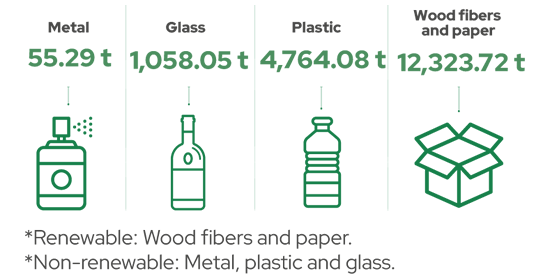
| REduce | We avoided the consumption of 11.7 TON of plastic in 2023 by lightening two Gourmet packages, which added to the efforts of previous years, means a reduction of 517.7 TON per year. |
| We have 5 packages identified for in 2024 and we will continue to advance in identifying opportunities in 100% of SKU's. | |
| We reduced the consumption of 5 TON of plastic per year by eliminating its use in the Buga facility by 80% through the implementation of the adhesive system in the production receipt robot and 70% in the storage of protein flour bags. | |
| REthink | We implemented the use of 100% recycled-sourced plastic pallets in our Buga operation, replacing conventional pallets that require frequent changes. |
| 30 SKU's of BredenMaseter donuts and muffins joined the Eco-labeling Clean Production Agreement, receiving the "I Choose to Recycle" seal, reaching a total of 69 SKU's in Chile. | |
| REsponsibilize | We belong to four post-consumer collectives, one in Colombia and three in Chile, through which we collaborate with chain actors to ensure that recyclable materials are effectively recycled. ● In Chile, through the GIRO collective, of which we are founding members in the household category, we collected and recovered the equivalent of 50.33 tons of paper and cardboard and 58.95 tons of plastics. ● In Colombia, through the Vision 30/30 post-consumer collective, we achieved the recovery of 12.58% of the packaging materials sent to the market by the collective's member companies. |
| Together with Amazóniko, we conducted a study to understand the PET oil collection and recycling chain in Bogotá and the strategies to be implemented in order to maximize its recycling capacity. |
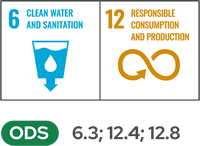
The Manos Verdes program aims not only to close the life cycle of vegetable fats, but also to promote their responsible disposal in order to benefit the environment and society.
We collected 3,112 tons of UCO and other fatty waste, to transform them into second-generation biodiesel, avoiding the emission of approximately 10,089.5 tons of CO2e (ISCC Standard) compared to the use of fossil diesel, and avoiding the contamination of 3,465 million liters of water due to inadequate oil management.
We conducted a comprehensive review of the processes, strengths and areas for improvement of Manos Verdes, and as a result of this assessment, this program became an integrated link in the value proposition of the business to our customers.
From the Out-of-Home Consumption business in Colombia, we advised more than 500 retail points of our customers in the timely change of frying oils, guaranteeing the quality of their products and the reputation of their brand.
We reaffirmed our commitment to supporting our industrial customers with the disposal of returns and damaged products such as margarines and oils.
We expanded the coverage of Manos Verdes to reach 744 retail points in D1 Stores in more than 55 municipalities in Colombia, seeking to continuously optimize the collection process by making routes more efficient and reducing the kilometers traveled to reduce our carbon footprint.
We participated alongside environmental entities and associations in an effort to generate awareness on used cooking oil as a contaminant of water sources, which included an awareness campaign in Bogota with more than 20 restaurants in the area.
